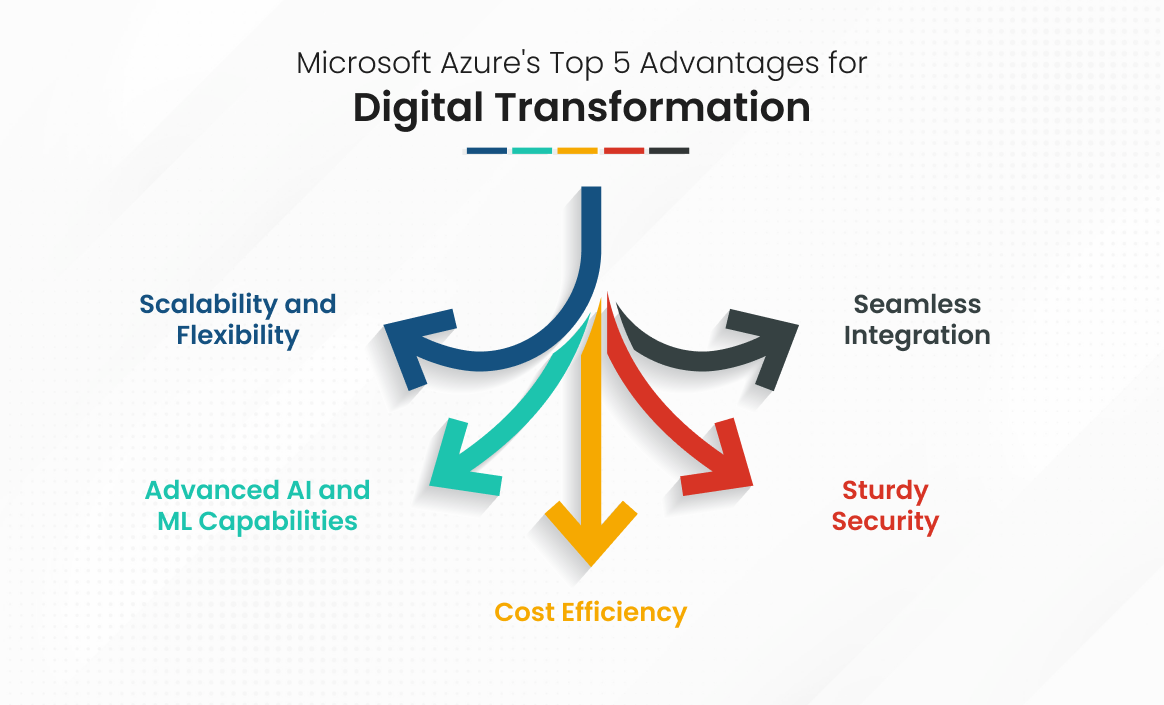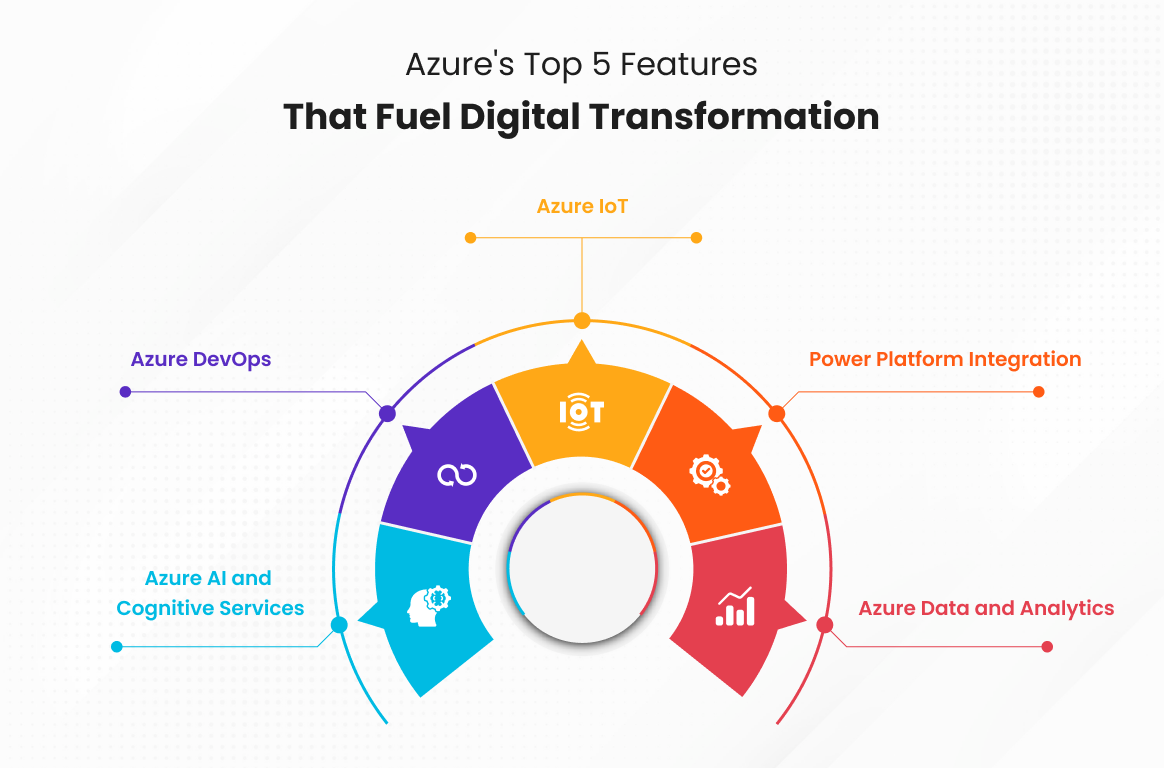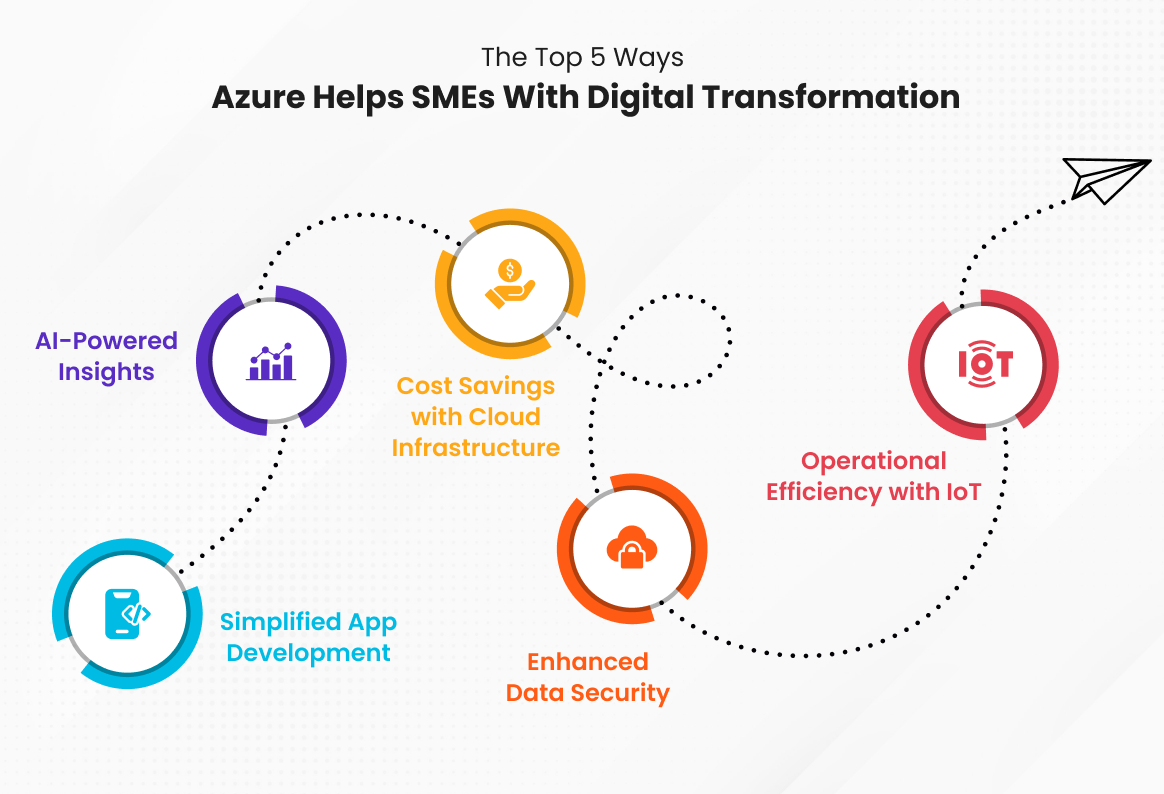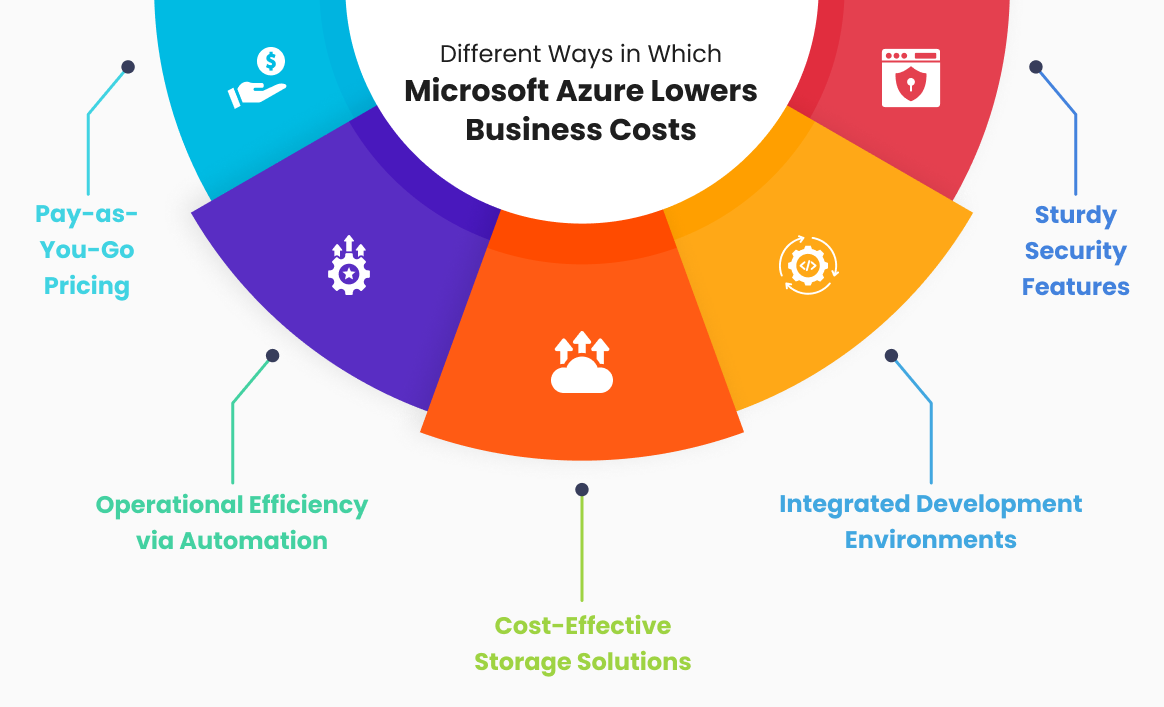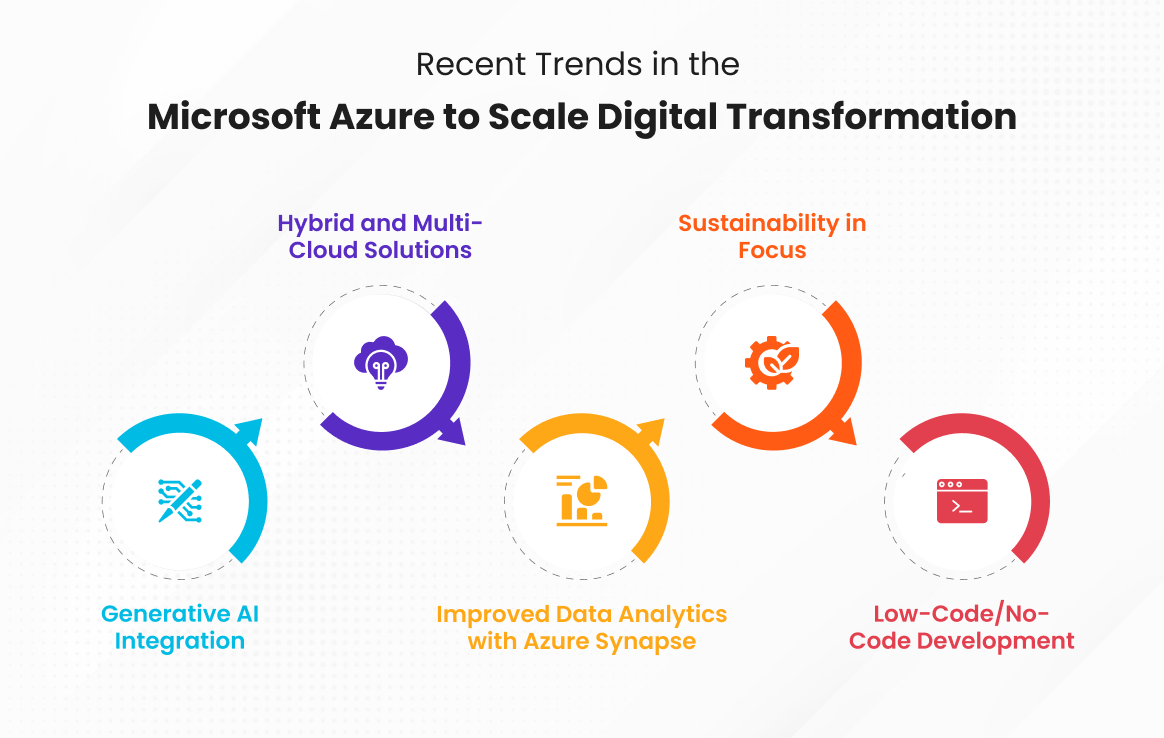Digital transformation has several advantages, including enhanced customer experience, data-driven decision-making, and streamlined procedures. Furthermore, scaling this up calls for reliable cloud infrastructure, which Azure excels at offering. Moreover, Microsoft Azure development services’ extensive security features, worldwide reach, and integration prowess allow companies to create unique digital solutions. Furthermore, that revolutionize sectors including retail, healthcare, finance, and manufacturing.
There’s more to Microsoft Azure than simply cloud storage. It gives businesses the power to use AI, machine learning, and predictive analytics to streamline processes, save expenses, and spur speedier innovation. Furthermore, with Microsoft Power application and Microsoft Power Platform, enterprises can easily develop and implement applications, automating critical processes that support expansion and scalability. Moreover, through the integration of these technologies into their digital environment, businesses can establish a robust framework for ongoing innovation and revenue expansion.
Microsoft Azure’s Top 5 Advantages for Digital Transformation
Scalability and Flexibility
Moreover, organizations can achieve workforce on-demand through Azure’s expansive global regions comprising more than 60 locations and providing cloud solutions across 140 nations. Furthermore, Azure ensures continuous, smooth elasticity, making it easier for corporations to align business requirements and/or consumer expectations and demands.
This comprises the flow of traffic, especially during rush hours, and the diversification that marshals seek.
Moreover, large companies have found the main value in this scalability that enables them to cut down their operation costs ranging from 49%.
Advanced AI and Machine Learning Capabilities
Furthermore, Azure supports the business operations of various companies and industries; some of these services are Azure Cognitive Services and Azure Machine Learning.
According to IDC, by 2024 AI investment will exceed $500 billion, and Azure enables organizations to leverage innovative AI solutions for work/tasks/ customer engagement.
Moreover, these features allow organizations to enhance productivity by up to 40% in terms of accelerating innovation to demystify complex processes.
Cost Efficiency
Cost optimization will become a greater company priority in 2024. Businesses have claimed up to 70% savings using Azure’s pay-as-you-go pricing model over conventional IT infrastructure.
Additionally, Azure offers spot pricing and reserved instances, which let companies reduce wasted resources and save money without sacrificing functionality.
Furthermore, Artificial Intelligence Solutions helps a lot in decreasing the cost and increasing the efficiency.
Sturdy Security
Azure now hosts over 3500 cybersecurity professionals, and the company currently spends over $1 billion per year on security technologies. Furthermore, while traditional solutions are available as on-premise systems, Azure also provides built-in security solutions like Azure Security Center. Moreover, Azure Sentry has gone a long way to help businesses cut data breach volume by 35% by 2024.
Azure meets or exceeds the most stringent regulatory requirements across multiple industries due to its 90+ compliance certifications.
Therefore, serves as a reliable solution for organizations seeking secure cloud services.
Seamless Integration
Azure is well connected with Microsoft Dynamics 365, and a few others to build an integrated digital ecosystem.
Furthermore, businesses could lower IT fragmentation by 25% in 2024 because more successful integration will allow teams to work on multiple platforms at the same time.
Current applications from both markets can benefit from this synergy in that it provides the business with a way to scale more quickly while maintaining the synergy that reduces operating costs.
Azure’s Top 5 Features That Fuel Digital Transformation
Azure AI and Cognitive Services
Moreover, integrate AI-driven capabilities like as natural language processing and picture identification into your offerings. Furthermore, by 2024, more than 95% of enterprises will have used AI. Azure makes it easy for companies to increase productivity and provide better user experiences.
Azure DevOps
Furthermore, utilize Azure’s project management and collaboration technologies to 63% accelerate software development. Moreover, simplify your SDLC, deploy products more quickly, and organize your teams to be as productive as possible.
Azure IoT
Furthermore, use real-time data insights to optimize operations. Predictive analytics services with IoT-enabled businesses realize up to 30% cost reduction and improved decision-making in sectors such as manufacturing and retail.
Power Platform Integration
Using low-code solutions, automate processes and create applications 70% faster, revolutionizing company agility. Furthermore, integrations between Azure and Microsoft Power Platform have already benefited over 500,000 companies.
Azure Data and Analytics
Make quicker, more informed choices by using cutting-edge data solutions like Azure Synapse. Furthermore, digital transformation services businesses that use Azure analytics report 33% improved efficiency, allowing for success-driven real-time insights.
The Top 5 Ways Azure Helps SMEs with Digital Transformation
Simplified App Development
By removing complicated code, SMEs can use Microsoft Power applications to launch bespoke applications 3x faster. Furthermore, in 2024, more than 80% of businesses that use Power Apps claim increased cost-efficiency and agility.
AI-Powered Insights
AI Development companies in India expect a 15% improvement in customer retention and engagement this year. Azure’s AI and predictive analytics help SMEs foresee trends and make data-driven choices.
Cost Savings with Cloud Infrastructure
Furthermore, Azure’s pay-as-you-go approach gives SMEs access to enterprise-grade infrastructure without requiring a significant upfront investment, reducing initial IT expenses by up to 50%.
Enhanced Data Security
Moreover, SMEs can handle sensitive data safely thanks to integrated security features and compliance tools. Azure guarantees excellent availability and peace of mind with 99.9% uptime.
Operational Efficiency with IoT
Furthermore, Azure IoT’s real-time monitoring and automation can boost productivity via connected device insights, enabling SMEs to enhance efficiency by 25%.
The Top Companies That Run Their Operations on Microsoft Azure
Rolls-Royce
Rolls-Royce sought to find a solution to reduce engine downtime on airplanes and increase fuel economy for its airline clients. Furthermore, with growing fleets, real-time engine monitoring was getting increasingly difficult.
To do predictive maintenance, Rolls-Royce used Azure IoT and machine learning. Moreover, they were able to predict issues before they happened by using this to track hundreds of engines in real-time throughout the world.
Results: Rolls-Royce decreased engine downtime by 30% and increased fuel economy by 15%, resulting in financial savings for the business and its customers. Furthermore, predictive diagnostics and engine repairs might now be completed more quickly thanks to the solution.
Heineken
Heineken sought to update its digital marketing approach to tailor interactions with consumers and engage them more successfully. Furthermore, this included employing data-driven insights. Conventional campaigns lacked adequate user behavior tailoring and were inefficient.
Heineken used the AI and analytics capabilities of Microsoft Azure to analyze consumer data in-depth, allowing for the creation of tailored marketing campaigns and product suggestions.
Results: Heineken increased customer engagement via tailored ads by 20% by using these findings. When compared to prior attempts, their focused advertising had 35% greater click-through rates.
Walgreens Boots Alliance
Furthermore, having to oversee a large chain of pharmacies in many different areas, Walgreens Boots Alliance had ineffective inventory management, which resulted in product waste and shortages.
By using Azure AI and machine learning to enhance inventory management, Walgreens was able to better predict demand and make sure that stores were suitably supplied based on real-time data.
Results: The business reduced waste by 12%, increasing operational effectiveness and lowering inventory expenses. Additionally, there was a 25% increase in the timely replenishment of goods, which improved consumer satisfaction.
GE Healthcare
It struggled to diagnose patients accurately and promptly because many of its diagnostic systems were unable to keep up with the rising costs of healthcare.
Healthcare developed an enhanced diagnostic platform by integrating Azure’s AI capabilities. Furthermore, faster patient data processing and AI-powered insights were made available by this technology, enabling medical practitioners to make better judgments.
Results: Faster and more accurate medical assessments were made possible by the AI-powered diagnostics system, which cut diagnosis times by 35%. As a result of this enhancement, patient outcomes improved and confidence in the Azure-powered healthcare system grew.
OrangeMantra
OrangeMantra provides cutting-edge digital transformation solutions to a variety of industries by using Microsoft Azure. Furthermore, OrangeMantra boosts its service offerings, which include application development, AI solutions, and data analytics services, by incorporating Azure’s cloud architecture.
This ensures that customers achieve scalable growth and better operational efficiency. Moreover, the requirement for scalable and trustworthy IT solutions to meet the various demands of clients is a Problem. Made use of Azure to provide all-encompassing digital solutions.
Results: Several companies were successfully helped to achieve digital transformation, which enhanced their operational agility and competitiveness in the market.
Different Ways in Which Microsoft Azure Lowers Business Costs
Pay-as-You-Go Pricing
Furthermore, Azure’s flexible pricing minimizes upfront costs and optimizes resource allocation based on real demand by allowing companies to pay only for what they use.
Operational Efficiency via Automation
Moreover, Azure’s automation technologies lessen human labor expenses by reducing workload, freeing up IT staff to concentrate on key objectives.
Cost-Effective Storage Solutions
Businesses can choose cost-effective tiers depending on consumption demands thanks to services like Azure Blob Storage, which provides reasonable data storage solutions.
Integrated Development Environments
Azure reduces costs and accelerates software development by integrating the development and testing environments.
Sturdy Security Features
Pre-installed security solutions shield companies from the financial consequences of security lapses by preventing pricey data breaches and compliance penalties.
Recent Trends in the Microsoft Azure to Scale Digital Transformation
Generative AI Integration
More and more, Azure is integrating generative AI elements, which allows organizations to create intelligent applications that generate content complete work, and enhance customer experience. Furthermore, companies can apply the more complex AI and Machine Learning development services schemes for interactive apps such as chatbots or content generation with AI solutions like Azure OpenAI Service.
Hybrid and Multi-Cloud Solutions
To have more flexibility and control, organizations are adopting solutions that involve both the Azure and on-premise environments as well as other cloud vendors. Furthermore, Azure Arc also assists organizations to better manage resources in many environments resulting in a more resilient IT strategy.
Improved Data Analytics with Azure Synapse
Organizations can now benefit from Azure Synapse Analytics to gain real-time data and analytics advantages. Moreover, for businesses that seek to enhance their performance through data analysis and attaining optimal organizational efficiency as well as enhancing the efficiency of the customer experience, this trend in big data comes in handy.
Sustainability in Focus
A growth area that Azure is incorporating is helping organizations manage and reduce their emissions through services. Furthermore, Generative AI Development Company includes tools for measuring emissions from activities of cloud computing and developing applications that are sustainable in the environment.
Low-Code/No-Code Development
Even more, people can build applications inside companies without a deep technical background due to the rise of low-code and no-code platforms including Microsoft Power Platform. Moreover, this trend accelerates development cycles and puts focus on ideas as it engages business users in digital transformation initiatives.
Wrapping Things Up
Microsoft Azure will continue to remain a strategic enabler for businesses that require an accelerated pace of digital transformations in 2024 and later. Azure strengths such as Artificial Intelligence, Machine Learning, and Internet of Things solutions help organizations to create, grow, and sell. Drawing from Azure’s unlimited cloud solutions, it becomes easier and faster to navigate the complexities of today’s economy.
Azure is the model to get for companies that want to change the way of working since its scalability is world-class, it interacts perfectly with other Microsoft Azure development services, and the security base is robust. Microsoft power apps development services solutions, also help a lot in development. Furthermore, some of the stockholders say it has revolutionized enterprises across different sectors to thrive in the continuously dynamic digital environment powered by Microsoft Azure.
FAQ’s
What is Microsoft Azure?
Microsoft Azure is a comprehensive suite of cloud services that provide storage, computing, and Artificial Intelligence which help businesses in their endeavors to optimize their operations and directly improve their customer offering.
How does Microsoft Azure stand to benefit one?
Some benefits include; that Azure is cheaper than traditional on-premises solutions that it enhances security and that it gives access to newer technologies. Its flexibility of paying only for what it gets used makes the management of IT expenses most efficient besides protecting data against malicious attacks as well as compliance issues.
What is new in Microsoft Azure today?
Some of the current and emerging trends include Artificial intelligence and machine learning, incorporation with low-code platforms, and Hybrid cloud solutions that will allow organizations to improve decision-making and de-silicification.

